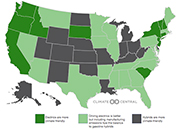Conventional gas-powered hybrid vehicles are still better for the climate than all-electric cars in most U.S. states, in part because these states still rely heavily on fossil fuels to produce electricity, according to a new report. In 39 states, high-efficiency hybrids, such as the Toyota Prius, produce fewer carbon emissions during their lifecycle than the least-polluting electric cars, an analysis by Climate Central found. Although an increased reliance on cleaner energy sources in some parts of the country doubled the number of states (32) where driving electric cars would be more environmentally friendly, that advantage disappeared when analysts also considered the high emissions associated with building the batteries and other components for the EVs. In 11 states, the best all-electric cars are better for the environment than gas-powered hybrids, even when manufacturing is taken into account. In 26 states, plug-in hybrid cars are the most climate-friendly vehicles, the analysis found.
Conventional Hybrids Better For Climate than EVs in Most U.S. States
More From E360
-
Climate
Lightning Strikes the Arctic: What Will It Mean for the Far North?
-
RIVERS
A Win for Farmers and Tribes Brings New Hope to the Klamath
-
Solutions
Deconstructing Buildings: The Quest for New Life for Old Wood
-
NATURAL DEFENSES
How Restored Wetlands Can Protect Europe from Russian Invasion
-
Solutions
Birds vs. Wind Turbines: New Research Aims to Prevent Deaths
-
FORESTS
Cambodian Forest Defenders at Risk for Exposing Illegal Logging
-
OPINION
The ‘Green’ Aviation Fuel That Would Increase Carbon Emissions
-
CONSERVATION
Out of the Wild: How A.I. Is Transforming Conservation Science
-
Energy
China’s Mega Dam Project Poses Big Risks for Asia’s Grand Canyon
-
Solutions
How Natural Solutions Can Help Islands Survive Sea Level Rise
-
INTERVIEW
Will U.S. Push on Seabed Mining End Global Consensus on Oceans?
-
Biodiversity
In Mexico’s ‘Avocado Belt,’ Villagers Stand Up to Protect Their Lands
